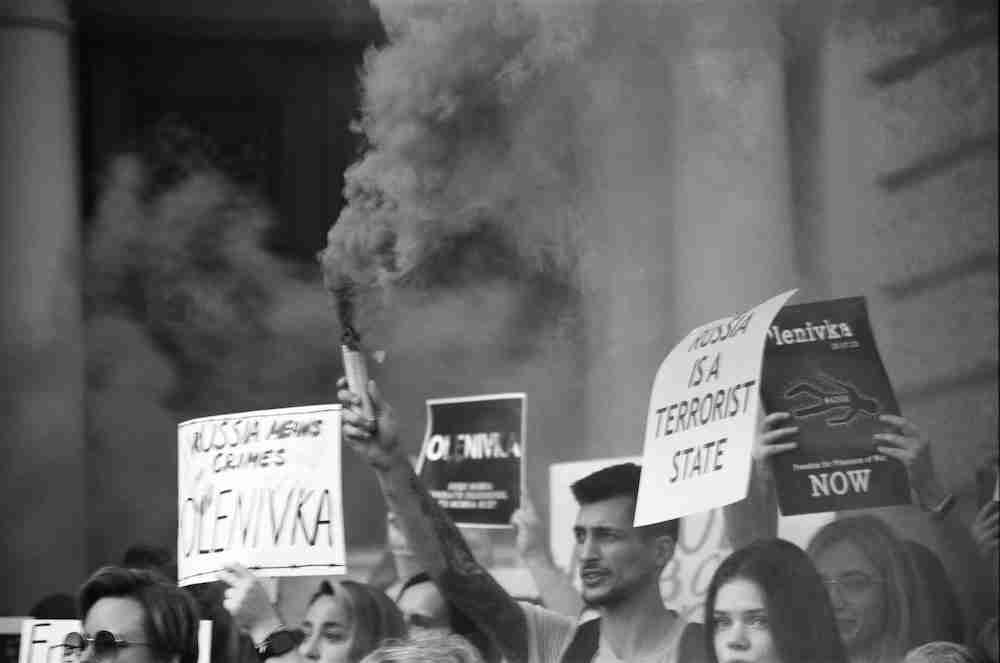The Ukraine War has intensified rising inflation, energy prices and supply chain disruption.
In this new WARC Spotlight, you can read our analysis below on the war in Ukraine and understand the impact for consumers and marketers a year after the conflict began.
Reactions to the Russian invasion of Ukraine: Analysis of consumer conversations and commentary.
On February 24th, 2022, Russia initiated its invasion of Ukraine, triggering a series of events that have had profound effects on the way of life all across Europe and beyond.
The invasion marked the resurgence of a significant conflict on mainland Europe, and sparked fears of a potential global conflict.

The war has resulted in an enormous loss of life, homes, and livelihoods in Ukraine, and its effects have reverberated throughout the global economy and geopolitics. The policies of the world’s largest economies have shifted significantly, raising the possibility of a new cold war or even the creation of a new world order.
“There’s concern that the emergence of a changed global order and a new “Cold War” may have a counter-balancing negative effect”
-@rtenews, Apr 11th, 2022
Garnering global support
In the aftermath of the crisis in Ukraine, the international community responded by rallying behind the country and imposing significant sanctions on Russian businesses, both by governments and individuals. These measures included both formal government sanctions and informal ‘social sanctions.’
Social sanctions, such as calls for boycotts or public shaming of companies with ties to Russia, put significant pressure on these businesses, even though they were not legally binding. However, many proved to be highly effective in spurring change.

Public action like this is not a new phenomenon; similar tactics have been used in the past to pressure countries like Apartheid-era South Africa and Nazi Germany, among other historical instances.
France’s opposition to the American invasion of Iraq during the ‘War on Terror’, sparked anti-French sentiment in the United States. As a result, some Americans called for a boycott of French products and some even went so far as to rename the beloved ‘French fries’ to ‘Freedom fries’, echoing similar sentiments during World War I when ‘sauerkraut’ was renamed ‘victory cabbage’ and ‘Frankfurters’ were dubbed ‘liberty dogs’.

“February 2003, North Carolina restaurant Cubbie’s renames French fries ‘Freedom Fries’ as part of America’s Francophobic reaction to French opposition to the Iraq War. Cubbie’s was inspired by restaurants renaming sauerkraut ‘victory cabbage’ & frankfurters ‘liberty dogs’ in WWI”
– @FrenchHist, Feb 22, 2023
The Russian invasion of Ukraine has led to similar reactions from various countries. As an act of solidarity, many countries have halted the import of Russian vodka and bars have stopped serving it.
In Quebec, one restaurant went so far as to remove Canada’s beloved national dish, Poutine, from its menu. The reason behind this decision was the phonetic similarity between the dish’s name and the French pronunciation of Vladimir Putin’s last name.

“A few months ago, I saw people buy bottles of Russian vodka to pour down their sinks in solidarity with Ukraine. Sadly, as a result of Putin’s price hike, I don’t have much expendable income to spend on Russian products to then destroy for virtue signaling purposes.”
– @LvivTyler, Dec 27th, 2022
Several well-known brands suspended their operations in Russia; closing down stores, scaling back operations and discontinuing engagement. Renowned global brands, including McDonald’s, Apple, Nike, Coca-Cola, Pepsi and H&M were among those that took such measures.
“Consumers are pushing for #BoycottCocaCola, #BoycottPepsi and #BoycottMcDonalds as the companies continue to operate in Russia despite Moscow’s invasion of Ukraine.”
– @trtworld, Mar 7th, 2022
“One thing companies that shy away from political actions don’t understand is that not taking a stance *is* making a political statement. Until these companies stop doing business in Russia, #BoycottMcDonalds, #BoycottCocaCola #BoycottPepsi”
– @mikesarzo, Mar 5th, 2022
Impact on Business
The ongoing conflict between Russia and Ukraine has had a significant impact on businesses, not just in the two countries involved, but also in the wider European region. The ripple effects of the war have been felt by countries with indirect ties to the conflict. The economic interactions between the surrounding countries have also been impacted as a result.

Collecting mentions of ‘energy crisis’ (energy, fuel, gas, oil etc.), political uncertainty (political uncertainty/unrest/turmoil/instability etc.), and supply chains (supply chain, trade etc.)
Supply Chain disruption:
The conflict has disrupted the trade routes that typically operate through Russia, Ukraine and central Asia/Europe.
The imposition of sanctions by Europe and other nations has further impacted the trade of resources sourced from Russia, resulting in significant disruptions to imports and exports for the countries involved. As a result, businesses relying on these resources have been severely affected.
Energy Crisis:
The global reliance on Russian oil and gas exports has also been affected by the sanctions and the war itself. Apart from being a significant source of oil, Ukraine was also a vital point for the transportation and trade of these resources.
This caused a considerable surge in energy costs worldwide, adversely affecting businesses and individuals alike. Even one year later, Europe continues to feel the effects of these disruptions.
Political uncertainty:
The political instability created significant risks for businesses operating in the region. There was tremendous pressure to exit Russia, but doing so came at a cost, including loss of business, cessation of operations, sale of assets, loss of jobs, and missed business opportunities. Despite the efforts to mitigate the impact of the instability, there remains a degree of legal and regulatory uncertainty surrounding the future of businesses in the region as they grapple with the challenge of operating in such an uncertain environment.
Impact on cost of living
The conflict has also had a direct result on consumers as price rises across various sectors has significantly impacted the cost of living across the world. The energy crisis has led to an increase in the costs of transportation and utility bills, while shortages of resources in Europe and other parts of the world have further exacerbated the situation. The trade crisis has caused shortages of commodities, including wheat, grain and other essential foods, as well as other goods.
“Russia shutting the Nord Stream pipeline and the surge in gas prices hits U.K. business hard and worsens the cost of living crisis. It means we need a bigger government offset to stop recession and to prevent more business closures.”
– @johnredwood, Sept 4th, 2022
“The grain agreement has saved Ukrainian farmers from bankruptcy, eased a global food shortage and helped bring down food prices. Now it is under threat”
– @theeconomist, Oct 31st, 2022

Mentions taken from August 1st 2022 to February 28th 2030
Collecting mentions of ‘food and groceries’ (food, farming, names of various vegetables, fruits and grocery items), ‘fule prices’ (fuel, gas, oil etc.), and utility bills (bills, electricity heating etc.)
Fuel prices:
The conflict had a huge impact on fuel prices worldwide, with Russia being one of the biggest suppliers and producers of natural gas and oil. Fuel prices have always been volatile and subject to fluctuations due to geopolitical forces, but the conflict exacerbated this volatility. The surge in price became a major point of contention across the globe.
The industrialising nations, in particular, were criticised by Western nations for exploiting the situation by increasing their purchase of cheap Russian oil following the invasion. This issue remained a source of tension and continued to affect the global economy.
“The way I think of it: the West is tacitly encouraging a massive transfer of wealth from Russia to India, via cheap energy. The embargo is as much a subsidy for India as it is a penalty for Russia. And allowing RU barrels to flow keeps prices cheaper for all consumers”
– @ed_fin, Jan 25th, 2023
Food prices:
Ukraine plays a crucial role in the global food market as a major exporter of grains and sunflower oil to Europe and other regions worldwide. The conflict has not only disrupted the production and export of these goods, it has also affected the livelihoods of farmers and caused food shortages in Europe, which could persist in the future.
Wheat, a primary commodity in Ukraine’s agricultural sector, has been particularly impacted. Ukraine and Russia together supply nearly 30% of the world’s wheat. The ripple effects of this were felt in the food industry, especially in the production of staples such as bread, pasta, and other wheat-based products.

On average, a 24% hike in agricultural prices was seen across Europe in 2022 – with grain, in particular, surging by 45%.
While discussions primarily centred around the continuation of existing agreements and whether Vladimir Putin would honour them, the overall volume of conversations has since stabilised. Specifically, conversations around wheat have dropped by 77% in the last six months compared to the preceding period.

Other food commodities have continued to be a source of concern, particularly vegetables, such as tomatoes, along with poultry and eggs. On average these have seen a 43% rise in price over the past year in Europe
“Eat turnips instead of tomatoes, says Environment Secretary as Brits face veg shortage”
– @lbc, Feb 23, 2023
“Bird flu and war in the Ukraine are the reason for an egg shortage in the UK. It’s that supermarkets charge us more without passing anything on to the farmers whose costs have rocketed.”
– @ AdamWalkerGB, Nov 17th, 2023
Sign off
The conflict in Ukraine has had a profound impact on the global community over the past year. In addition to the humanitarian crisis, the conflict has caused significant social and economic pressures on businesses and consumers worldwide.
As the situation remains dynamic, we can expect to see further shifts and changes unfold in the coming months and years. It is vital to remain aware of the ongoing developments and their potential impacts to prepare for the future.






